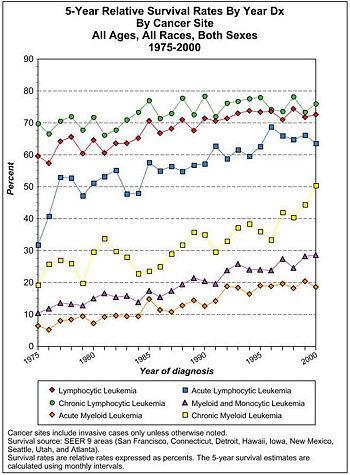B-Cell chronic lymphocytic leukemia
In medicine, B-Cell chronic lymphocytic leukemia, also called chronic lymphocytic leukemia (CLL), is a "chronic leukemia characterized by abnormal B-lymphocytes and often generalized lymphadenopathy. In patients presenting predominantly with blood and bone marrow involvement it is called chronic lymphocytic leukemia (CLL); in those predominantly with enlarged lymph nodes it is called small lymphocytic lymphoma. These terms represent spectrums of the same disease."[1][2][3]
Prognosis
Staging information
B-Cell chronic lymphocytic leukemia staging information from the National Cancer Institute's Physician Data Query
Treatment
B-Cell chronic lymphocytic leukemia treatment information from the National Cancer Institute's Physician Data Query
As a primary antineoplastic agent, fludarabine may be more effective than chlorambucil.[4]
| Regimen | Effectiveness | Adverse effects |
|---|---|---|
| Combination:[6][7] • Fludarabine • Cyclophosphamide • Rituximab |
Complete remission in 25% to 72% | • Neutropenia • 10% rate of infection during first year • Rituximab induced fever (37%), chills (50%), hypotension (13%), nausea and vomiting |
References
- ↑ Anonymous (2025), B-Cell chronic lymphocytic leukemia (English). Medical Subject Headings. U.S. National Library of Medicine.
- ↑ Shanafelt TD, Byrd JC, Call TG, Zent CS, Kay NE (September 2006). "Narrative review: initial management of newly diagnosed, early-stage chronic lymphocytic leukemia". Ann. Intern. Med. 145 (6): 435–47. PMID 16983131. [e]
- ↑ Chiorazzi N, Rai KR, Ferrarini M (February 2005). "Chronic lymphocytic leukemia". N. Engl. J. Med. 352 (8): 804–15. DOI:10.1056/NEJMra041720. PMID 15728813. Research Blogging.
- ↑ Rai KR, Peterson BL, Appelbaum FR, et al (December 2000). "Fludarabine compared with chlorambucil as primary therapy for chronic lymphocytic leukemia". N. Engl. J. Med. 343 (24): 1750–7. PMID 11114313. [e]
- ↑ Anonymous. Chronic Lymphocytic Leukemia Treatment -. National Cancer Institute. Retrieved on 2009-03-31.
- ↑ Wierda W, O'Brien S, Wen S, et al (June 2005). "Chemoimmunotherapy with fludarabine, cyclophosphamide, and rituximab for relapsed and refractory chronic lymphocytic leukemia". J. Clin. Oncol. 23 (18): 4070–8. DOI:10.1200/JCO.2005.12.516. PMID 15767647. Retrieved on 2009-03-31. Research Blogging.
- ↑ Tam CS, O'Brien S, Wierda W, et al (August 2008). "Long-term results of the fludarabine, cyclophosphamide, and rituximab regimen as initial therapy of chronic lymphocytic leukemia". Blood 112 (4): 975–80. DOI:10.1182/blood-2008-02-140582. PMID 18411418. Retrieved on 2009-03-31. Research Blogging.
